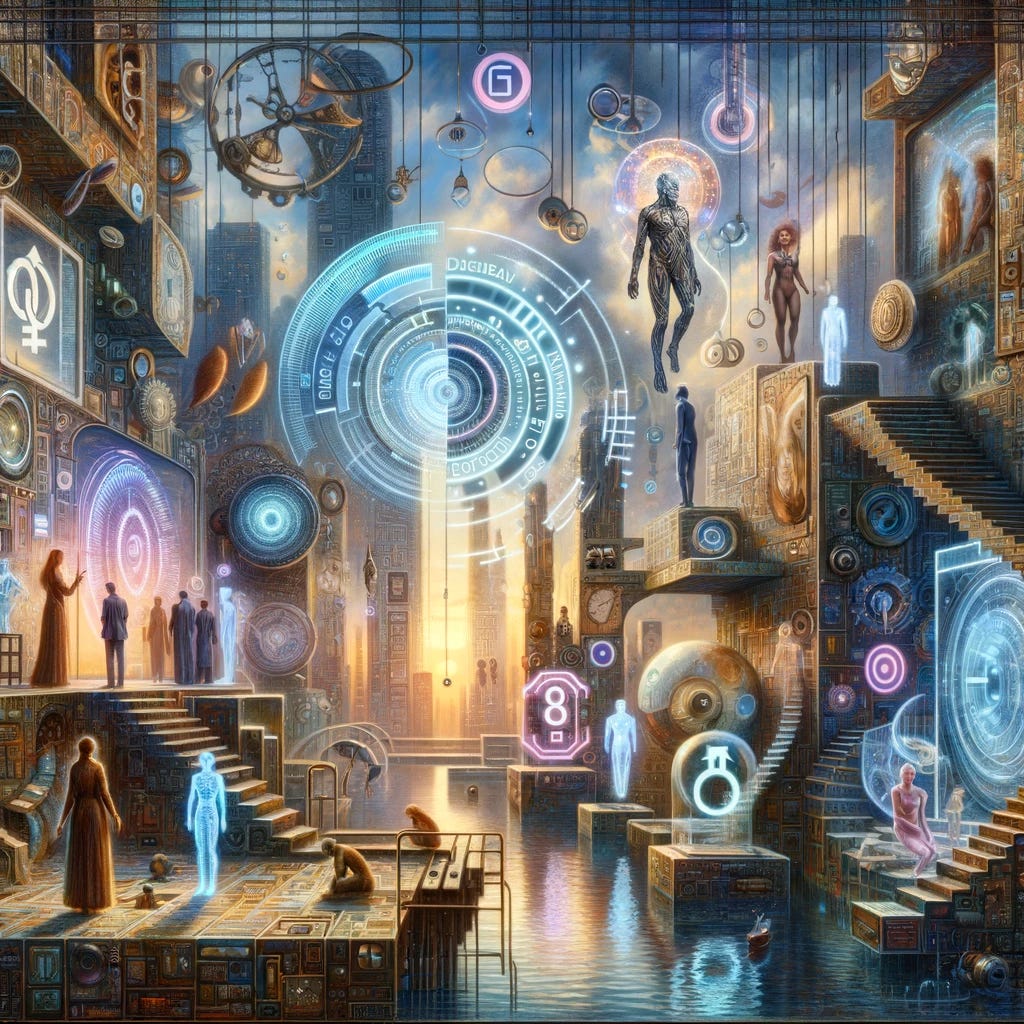Identity in the Age of Artificial Enlightenment
Where Pronouns Meet Processors, and the Conversation Gets Interesting
Image Generated By Dalle-3 AI Because Stick Figures challenge me
Disclaimer: I have not lost the plot simply because I never found it. Am I crazy? Probably! It's fun, and I like it! Am I 'off my Rocker'? Yes, that is in the kitchen, and I am in an office chair. Am I 'cracked'? How do you think that little Treckie entity escaped my closely guarded closet (see ending statement)? Now that I have all the nitty gritty stuff out of the way, I will launch into my lunacy-inspired diatribe.
What do I find at the intersection of a computer game, Ghost Recon Wildlands, A LinkedIn article about a new book release and my still fertile, philosophic brain? Welcome to my nightmare, or should I say philosophic ramblings!
Pronouns — are they normal? First, let's ask a question: What is normal? Normal is a relative term. What I mean by that is that it is relative to something other than itself, for instance, community, club, ethnicity, or sexuality. Furthermore, it is not static: what is considered normal changes over time. Normal is a chronologically or 'temporally' sensitive social construct: If you like. It is affected and moulded by events over time within the chronosystem and resides in a constant state of flux.
In more simple terms, temporal dynamics influence human development and societal norms. So, yes, pronouns are normal now. They may cause confusion, consternation, and annoyance, but they are normal at this confluence in time. Change is a difficult concept to accept sometimes, but it is a reality within the spectrum of human societies.
Now, if you think pronouns are problematic, wait until Transhumanism becomes reality! And it will happen! Look at Elon Musk's brain chip: it is already implanted in a human and functioning. What pronouns will Transhumans demand to showcase both human and AI traits?
What happens when AI reaches sentience or sapience? If you think 'gender-bending' pronouns are problematic now, wait until the Human/AI intersection happens. I, myself, look forward to the change: do you? There now, Eureka! I've done it. I have allowed my inner Trekkie out of the closet.
Chronosystem: The system of time and the events that occur over time were first posited by Urie Bronfenbrenner in his Biopsychosocial ecological
Systems theory.
Temporal: Originated from the Latin' temporalis:' a word meaning something pertaining to time.
Transhumanism: Transhumanism is a state where humans and technology merge into one functioning entity.
Sentience: Sentience is the ability to feel emotions.
Sapience: Sapience is the ability to think and acquire knowledge.
The Pronoun Minefield
(This list will most likely never be comprehensive)
PS: Remember, using a person's chosen pronouns is not a game of what that linguistic convention is: semantics or pragmatics. It is about respect.
He/Him/His: Traditionally used for individuals who identify as male.
She/Her/Hers: Traditionally used for individuals who identify as female.
They/Them/Theirs: This is a singular form used for individuals who identify outside the binary categories of male and female or for those who prefer not to disclose their gender. It's also used to refer to people in general.
Ze/Zir/Zirs is a gender-neutral pronoun set for someone who does not identify as strictly male or female.
Ze/Hir/Hirs: Another set of gender-neutral pronouns, pronounced "zee" and "here."
Xe/Xem/Xyrs: Pronounced "zee," "zem," and "zirs," these pronouns are also gender-neutral and have been adopted by some as an alternative to more traditional pronouns.
Ey/Em/Eirs: Pronounced similarly to "they/them/theirs" but without the initial 'th' sound, offering another gender-neutral option.
Per/Per/Pers: Short for "person," this set can be used for individuals seeking to avoid gendered pronouns entirely.
And My Theoretical Future:
Ai/Ais/Aiself: Pronounced "eye," "eyes," and "eyself," these pronouns are for transhumans who wish to celebrate their integrated AI consciousness alongside their human identity.
Syn/Syns/Synself: Short for "synthetic," This pronoun reflects a synthesis of biological and synthetic components. These pronouns are suitable for individuals who identify as a blend of human and technology without a specific emphasis on either.
Neu/Neus/Neuself: This pronoun is derived from "neural," highlighting the neural networks that are critical components of human brains and AI systems. Transhumans use these pronouns because they strongly identify with the symbiosis of their biological and digital minds.
Bi/Bis/Biself: From "binary" or "biotechnological," these pronouns reflect the duality in the nature of transhumans; they embody both the digital and organic elements of their identity.
Om/Oms/Omself: These pronouns suggest a sense of omniscience or omnipresence, often associated with advanced AI capabilities. Transhumans use them to emphasize their expanded sensory and cognitive abilities.
Xi/Xis/Xiself: Pronounced "zee," "zees," and "zeeself," these pronouns serve as neutral pronouns for transhumans, especially those whose identity is primarily defined by their transcendence above and beyond traditional human limitations.
Ter/Ters/Terself: These pronouns are short for "terrestrial." Transhumans use them to retain a connection to their earthly human origins while still acknowledging their evolution above them.
Are you ready for this? Yeah!
References
Wikipedia. 2024. "Biopsychosocial Model." Wikimedia Foundation. Last modified: March 18, 2024. https://en.wikipedia.org/wiki/Biopsychosocial_model.



